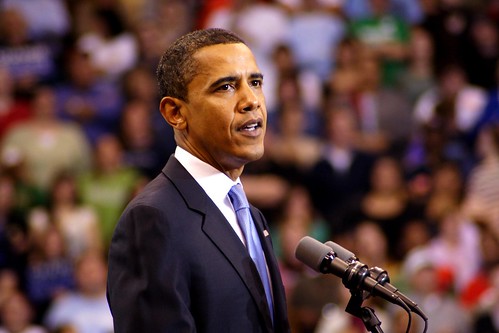The
economist makes it:
[Compared to McCain,] Is Mr Obama any better? Most of the hoopla about him has been about what he is, rather than what he would do. His identity is not as irrelevant as it sounds. Merely by becoming president, he would dispel many of the myths built up about America: it would be far harder for the spreaders of hate in the Islamic world to denounce the Great Satan if it were led by a black man whose middle name is Hussein; and far harder for autocrats around the world to claim that American democracy is a sham. America’s allies would rally to him: the global electoral college on our website shows a landslide in his favour. At home he would salve, if not close, the ugly racial wound left by America’s history and lessen the tendency of American blacks to blame all their problems on racism.
So Mr Obama’s star quality will be useful to him as president. But that alone is not enough to earn him the job. Charisma will not fix Medicare nor deal with Iran. Can he govern well? Two doubts present themselves: his lack of executive experience; and the suspicion that he is too far to the left.
There is no getting around the fact that Mr Obama’s résumé is thin for the world’s biggest job. But the exceptionally assured way in which he has run his campaign is a considerable comfort. It is not just that he has more than held his own against Mr McCain in the debates. A man who started with no money and few supporters has out-thought, out-organised and out-fought the two mightiest machines in American politics—the Clintons and the conservative right.
Political fire, far from rattling Mr Obama, seems to bring out the best in him: the furore about his (admittedly ghastly) preacher prompted one of the most thoughtful speeches of the campaign. On the financial crisis his performance has been as assured as Mr McCain’s has been febrile. He seems a quick learner and has built up an impressive team of advisers, drawing in seasoned hands like Paul Volcker, Robert Rubin and Larry Summers. Of course, Mr Obama will make mistakes; but this is a man who listens, learns and manages well.
It is hard too nowadays to depict him as soft when it comes to dealing with America’s enemies. Part of Mr Obama’s original appeal to the Democratic left was his keenness to get American troops out of Iraq; but since the primaries he has moved to the centre, pragmatically saying the troops will leave only when the conditions are right. His determination to focus American power on Afghanistan, Pakistan and proliferation was prescient. He is keener to talk to Iran than Mr McCain is— but that makes sense, providing certain conditions are met.
Our main doubts about Mr Obama have to do with the damage a muddle-headed Democratic Congress might try to do to the economy. Despite the protectionist rhetoric that still sometimes seeps into his speeches, Mr Obama would not sponsor a China-bashing bill. But what happens if one appears out of Congress? Worryingly, he has a poor record of defying his party’s baronies, especially the unions. His advisers insist that Mr Obama is too clever to usher in a new age of over-regulation, that he will stop such nonsense getting out of Congress, that he is a political chameleon who would move to the centre in Washington. But the risk remains that on economic matters the centre that Mr Obama moves to would be that of his party, not that of the country as a whole.
There's much more on the economist piece, endorsing Barack Obama. More than anything else, it's a heavy indictment of how John McCain has run his campaign. It's a cautious, calculated endorsement; no orgasmic (and naive) blabber about how inspiring he is. I can't endorse Obama, but
I can endorse the article.
For a slightly different take on Obama and McCain, see
Swaminathan Aiyar for the Times of India.





